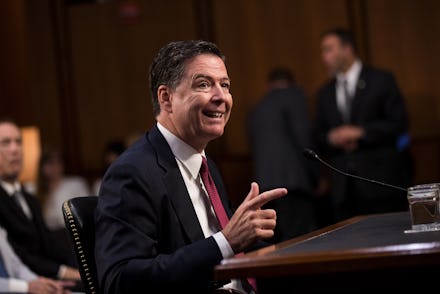Here's where James Comey's "lordy" ranks on a list of viral Trump-related vocabulary words

James Comey brought "lordy" to the forefront of America's lexicon Thursday when he used the word during his testimony before the Senate Intelligence Committee.
The proof is in the Dictionary.com searches. Searches for the word "lordy" rose 3,166% on the site during Comey's hearing, Dictionary.com staffers told Mic. Searches for "recusal," "dossier" and "probative" went up 858%, 276% and 370%, respectively.
Dictionary.com defines "lordy" as "an exclamation of surprise or dismay," noting that it's most popular in the United States and Canada.
"I don't think people are looking it up because they don't know what it means," lexicographer Jane Solomon told Mic during a Thursday phone interview. "When we see lookups related to some sort of event going on, be it pop culture or political, it shows our users are very engaged in the things going on around them."
It's not just Comey. Since he first ran for office, Trump has added or changed the way we use more than a dozen words and phrases.
"The way in which this administration speaks is different than others in the past," Dictionary.com marketing manager Lauren Sliter said. "It's probably going to be interesting [Trump's] entire term."
When it comes to viral Trump-related words, it turns out "lordy" only ranks second in terms of spiking Dictionary.com searches.
"Bigly" tops the list by a wide margin, with related searches increasing by 19,687% on Oct. 20, when then-candidate Trump used the term during a presidential debate.
"Carnage" ranks third on the list, with a 2,410% spike on Jan. 20 after Trump used the word multiple times during his inauguration speech.
"Xenophobia," Dictionary.com's Word of the Year for 2016, ranks fourth, with a 938% increase on June 24, 2016 after Brexit.
Searches for "executive order" rose 844% on Jan. 30, three days after Trump first issued his controversial Muslim travel ban, making that phrase fifth on this list.
"Misogynist" ranks sixth after spiking on Nov. 9, the day after election day, when related searches jumped 643% following Trump's defeat of Hillary Clinton, who many expected to be the first woman president.
Coming in seventh place is the term "Trumpery," which trended again on Nov. 8 after first making its mark in March 2016 when a related meme went viral on Twitter.
"Fillibuster," "fascism," and "alternative facts" round out the top 10.
What about "covfefe," you ask? Trump's Twitter typo doesn't make the list because it isn't a real word, but Dictionary.com told Mic the typo was May's most misspelled term.
The site also added the phrase "alt-right" after the white nationalist movement's Trump-related rise in 2016.